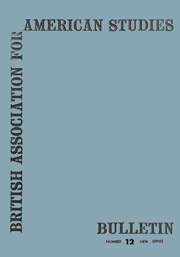No CrossRef data available.
Article contents
State Rights and the South 1850–1860
Published online by Cambridge University Press: 17 February 2011
Extract
“Our people”, declared Jefferson Davis on February 22, 1862,“have rallied with unexampled unanimity to the support of the great principles of constitutional government, with firm resolve to perpetuate by arms the rights which they could not peacefully secure”. The President of the newly formed Confederacy was delivering his inaugural address; and, in so doing, was using the language – when he talked about defending ‘rights’ and ‘constitutional government’ – in which Southerners had consistently stated their case over the preceding decade. They had argued, in the main, that the policies to which they objected were not merely harmful; they were unconstitutional. Northern interests had not merely desired the Federal Government to act unfairly; they had desired it to enforce measures it simply had no power to deal with.
- Type
- Research Article
- Information
- Copyright
- Copyright © British Association for American Studies 1965




